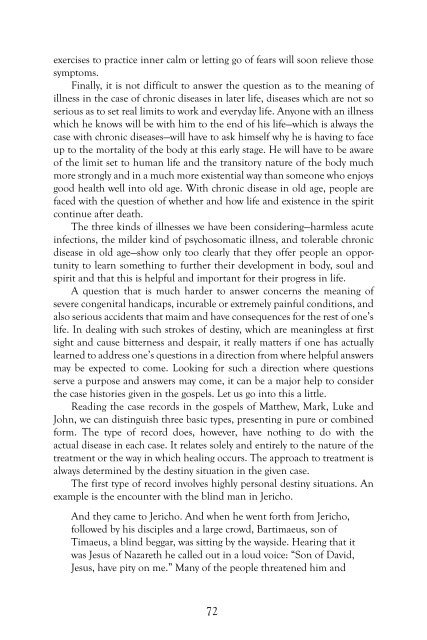When Healing Becomes Educating, Vol. 2 - Waldorf Research Institute
When Healing Becomes Educating, Vol. 2 - Waldorf Research Institute
When Healing Becomes Educating, Vol. 2 - Waldorf Research Institute
Create successful ePaper yourself
Turn your PDF publications into a flip-book with our unique Google optimized e-Paper software.
exercises to practice inner calm or letting go of fears will soon relieve those<br />
symptoms.<br />
Finally, it is not difficult to answer the question as to the meaning of<br />
illness in the case of chronic diseases in later life, diseases which are not so<br />
serious as to set real limits to work and everyday life. Anyone with an illness<br />
which he knows will be with him to the end of his life—which is always the<br />
case with chronic diseases—will have to ask himself why he is having to face<br />
up to the mortality of the body at this early stage. He will have to be aware<br />
of the limit set to human life and the transitory nature of the body much<br />
more strongly and in a much more existential way than someone who enjoys<br />
good health well into old age. With chronic disease in old age, people are<br />
faced with the question of whether and how life and existence in the spirit<br />
continue after death.<br />
The three kinds of illnesses we have been considering—harmless acute<br />
infections, the milder kind of psychosomatic illness, and tolerable chronic<br />
disease in old age—show only too clearly that they offer people an opportunity<br />
to learn something to further their development in body, soul and<br />
spirit and that this is helpful and important for their progress in life.<br />
A question that is much harder to answer concerns the meaning of<br />
severe congenital handicaps, incurable or extremely painful conditions, and<br />
also serious accidents that maim and have consequences for the rest of one’s<br />
life. In dealing with such strokes of destiny, which are meaningless at first<br />
sight and cause bitterness and despair, it really matters if one has actually<br />
learned to address one’s questions in a direction from where helpful answers<br />
may be expected to come. Looking for such a direction where questions<br />
serve a pur pose and answers may come, it can be a major help to consider<br />
the case histories given in the gospels. Let us go into this a little.<br />
Reading the case records in the gospels of Matthew, Mark, Luke and<br />
John, we can distinguish three basic types, presenting in pure or combined<br />
form. The type of record does, however, have nothing to do with the<br />
actual disease in each case. It relates solely and entirely to the nature of the<br />
treatment or the way in which healing occurs. The approach to treatment is<br />
always determined by the destiny situation in the given case.<br />
The first type of record involves highly personal destiny situations. An<br />
example is the encounter with the blind man in Jericho.<br />
And they came to Jericho. And when he went forth from Jericho,<br />
followed by his disciples and a large crowd, Bartimaeus, son of<br />
Timaeus, a blind beggar, was sitting by the wayside. Hearing that it<br />
was Jesus of Nazareth he called out in a loud voice: “Son of David,<br />
Jesus, have pity on me.” Many of the people threatened him and<br />
72
















